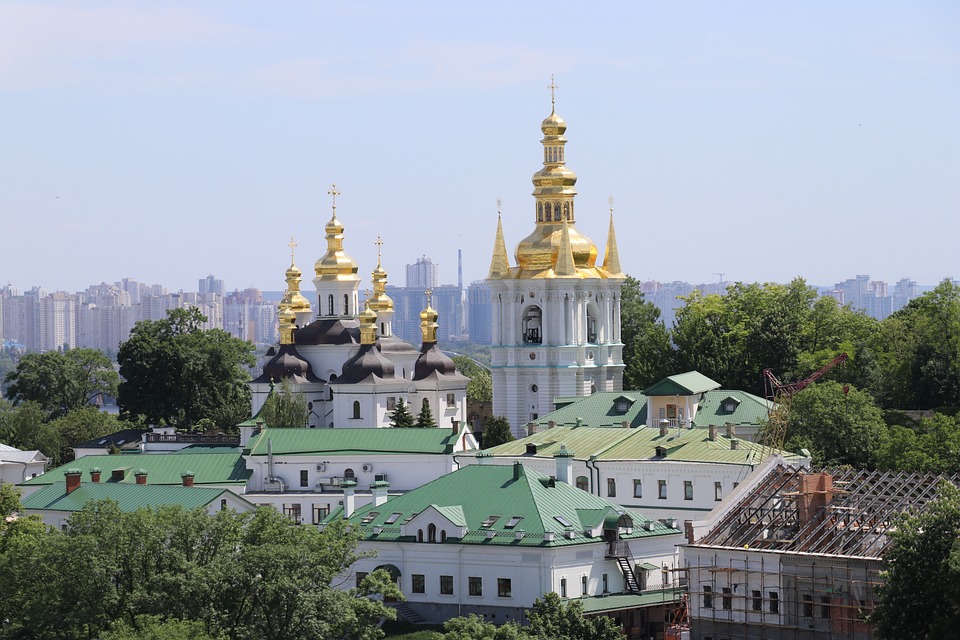
Ukrainian is a language very similar to both Polish and Russian, which can raise the question of whether knowing one of these means automatically understanding Ukrainian. Most speakers of Polish and Russian would probably say that they cannot understand Ukrainian without having studied it. However, this raises a new interesting question. What if someone knows both Russian and Polish? It might seem intuitive to think of Ukrainian as kind of a halfway point between these languages and conclude that, surely, knowing both of them means being able to understand Ukrainian without having have learned it. However, it is not that simple. Although it is true that Ukrainian is similar to both of these languages, it has peculiarities of its own rather than being a simple halfway point.
Although speakers of Polish and Russian will be able to understand a significant amount of Ukrainian words, sometimes entire sentences, and often be able to get the main idea of a conversation, this is not the same as being able to understand the language at an intermediate or advanced level. Ukrainian has many features which diverge from both Russian and Polish, and anyone wanting to learn it after knowing the first two will still have a fair amount of learning to do.
Ukrainian has many sounds changes separating it from Polish and Russian
These range from the more obvious ones like differences in palatalization, to ones that can leave a word unrecognizable to the untrained ear, like Polish and Russian ‘o-‘ becoming ‘vi-‘. Of course, these do follow a pattern, so, once one gets used to them, it becomes a lot easier to recognize cognates. However, it can take a bit of getting used to, so, to someone who is new to Ukrainian, a lot of the cognates might not be recognizable at first. Even after knowing the patterns, learners still have to get used to them to catch words quickly.
In some cases, the Polish and Russian words are more similar to each other than the Ukrainian word is to either
This even applies to many basic words. For example, the Polish “widzieć” and Russian “vidyet'”, meaning “to see”, sound almost exactly the same, while the Ukrainian “bachyty” sounds like a totally different word. Granted, Polish does have a similar, commonly used word “zobaczyć”, a form of “to see” in the imperfective aspect, which corresponds to Ukrainian “zаbachyty”, and “baczyć”, a literary form of “to pay attention”, these words are used differently in Polish and Ukrainian, and the differences might not be immediately obvious.
Some words sound similar, but the meanings differ
There are also words which are similar, but used differently. A good example is Ukrainian “bahato”, meaning “many”. This word is similar to Polish “bogaty” and Russian “bogatyy”, both of which mean “rich” and cannot be used to mean “many”. A similar example is Ukrainian “duzhe”, meaning “many”. This is similar to the Polish “duży”, meaning “large”.
Another category of words are those in which all three languages differ, sometimes with the Polish and Russian versions differing a bit less. For example, in Ukrainian, although it it possible to say “store” as “mahazyn”, there is also the more unique Ukrainian word, “kramnytsya”, cognate with the archaic Polish word “kramnica”. In Polish, the modern word for store is “sklep”, similar to the Russian “sklyep”, meaning “burial vault”. The Russian word for store is “magazin”, which is similar to the Polish word “magazyn”, “warehouse”.
It would probably be fairly easy for a Polish speaker to infer “magazin” meaning “store” from context, but much more difficult for a Russian speaker to infer “sklep”. “Kramnica” would likely confuse both Polish and Russian speakers.
One interesting example of words which sound the same, but have different meanings is the case of the Polish, Ukrainian, and Russian words for “melon”, “watermelon”, and “pumpkin”. In Polish, “dynia” means “pumpkin”, while Ukrainian “dynia” and Russian “dynia” both mean “melon”, which, in Polish, is “melon”. The Polish word for watermelon is “arbuz”, sounding almost identical to the Russian “arbuz”, also meaning “watermelon”. The Ukrainian word “harbuz”, which sounds similar, means “pumpkin”. The Russian word for pumpkin is “tykva”, similar to neither Polish nor Ukrainian. Likewise, the Ukrainian word for “watermelon” is “kavun”. As a bonus, “watermelon” is “dynia” in parts of Bulgaria.
The languages are definitely similar, but still need to be learned seperately
The similarities between Russian, Ukrainian, and Polish languages are undeniable. That being said, these are not mutually intelligible languages and still needs to be learned separately. Different sound changes, false cognates, and words that are just different in some cases make these languages that all require separate focus.
Russian, Polish, and Ukrainian can all be learned on Mondly. Russian can also be learned on Rocket Languages.


